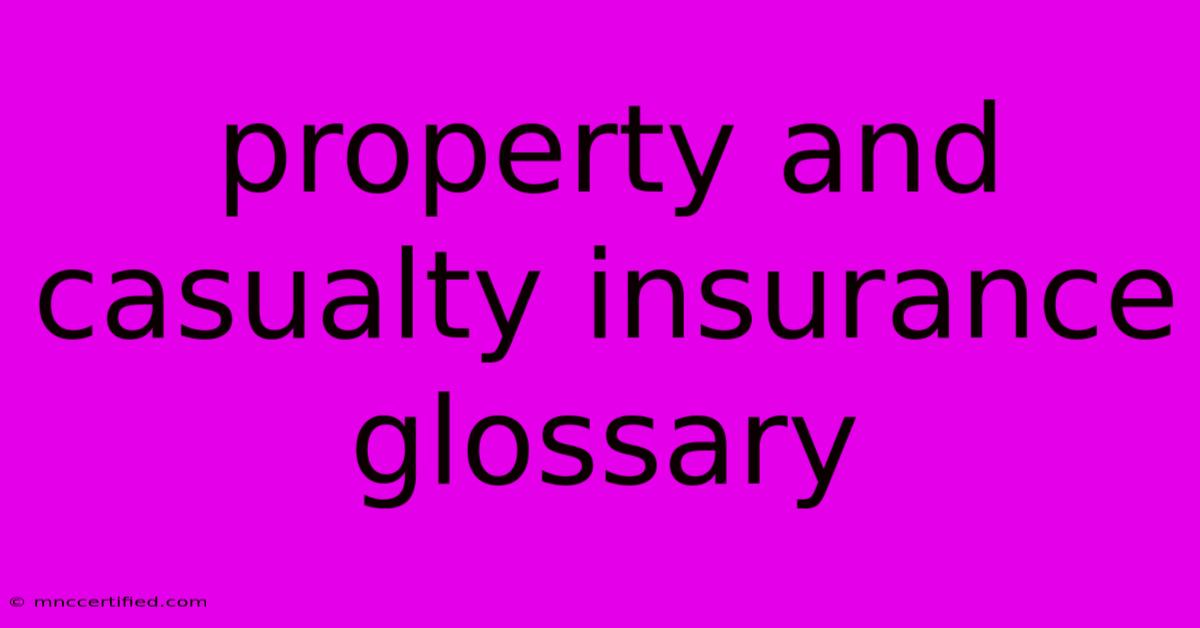Property And Casualty Insurance Glossary
You need 3 min read
Post on Nov 08, 2024

Property And Casualty Insurance Glossary
Table of Contents
Your Guide to Understanding Property and Casualty Insurance: A Glossary of Key Terms
Navigating the world of property and casualty insurance can feel overwhelming, especially if you're unfamiliar with the jargon. This comprehensive glossary will demystify key terms and concepts, empowering you to make informed decisions about your insurance needs.
A
- Actual Cash Value (ACV): The cost of replacing a damaged or destroyed item minus depreciation.
- Agent: An individual who represents an insurance company and sells policies to clients.
- Aggregate Limit: The maximum amount an insurer will pay for all claims within a policy period, regardless of the number of claims.
- All-Risk Coverage: Covers a wide range of perils, with exclusions specified in the policy.
B
- Binder: A temporary insurance contract that provides coverage until a formal policy is issued.
- Bodily Injury Liability: Coverage for injuries caused to another person by the insured.
- Broker: An individual who represents clients and helps them find insurance policies from various companies.
C
- Cancellation: The termination of an insurance policy before its expiration date.
- Claim: A request for payment from an insurance company for a covered loss.
- Coinsurance: A provision requiring the policyholder to share a portion of the loss with the insurance company.
- Comprehensive Coverage: Covers losses to your vehicle from perils other than collisions, such as theft, fire, or vandalism.
- Deductible: The amount the policyholder pays out-of-pocket before the insurance company covers the remaining costs of a claim.
D
- Depreciation: The decrease in value of an asset over time due to wear and tear or obsolescence.
- Direct Writer: An insurance company that sells policies directly to customers without using agents or brokers.
- Driver's Education: A course that teaches safe driving practices and may qualify for discounts on auto insurance.
E
- Endorsement: An addition to an insurance policy that modifies or extends coverage.
- Exclusions: Specific events or circumstances that are not covered by an insurance policy.
F
- Flood Insurance: Coverage for losses caused by flooding, typically purchased separately from standard homeowners insurance.
- Franchise Deductible: A deductible that applies only if the loss exceeds a certain percentage of the insured value.
G
- Grace Period: A period of time after the premium due date during which the policy remains in effect.
- Guaranteed Replacement Cost (GRC): Coverage that pays for the full replacement cost of a damaged or destroyed item, regardless of depreciation.
H
- Hazard: A condition that increases the likelihood of a loss.
- Homeowners Insurance: Coverage for losses to your home and belongings, including liability for injuries on your property.
I
- Insured: The individual or entity covered by an insurance policy.
- Insurer: The insurance company that provides coverage.
L
- Liability Coverage: Coverage for financial losses you are legally responsible for causing to others.
- Loss: The financial damage or loss that results from an insured event.
M
- Medical Payments Coverage: Coverage for medical expenses incurred by the insured or passengers in their vehicle, regardless of fault.
- Mortgagee: The lender who holds a mortgage on a property.
N
- Negligence: Failure to exercise reasonable care, which can lead to liability.
P
- Peril: A cause of loss, such as fire, theft, or natural disaster.
- Policy: The written contract between the insured and the insurer.
- Premium: The amount paid by the insured to maintain coverage under the policy.
- Property Damage Liability: Coverage for damage to another person's property caused by the insured.
R
- Replacement Cost Value (RCV): The cost of replacing a damaged or destroyed item with a similar item, without considering depreciation.
- Risk: The possibility of loss.
S
- Subrogation: The right of an insurer to pursue reimbursement from a third party who caused a covered loss.
T
- Total Loss: A loss that exceeds the value of the insured property.
U
- Umbrella Liability Coverage: Additional liability coverage that extends beyond the limits of other policies.
V
- Valuation: The process of determining the worth of an insured item.
W
- Waiver: A written agreement that relinquishes a legal right or claim.
Understanding this glossary can help you navigate the world of property and casualty insurance with confidence. Remember, if you have any questions or need further clarification, don't hesitate to contact an insurance professional.

Property And Casualty Insurance Glossary
Thank you for visiting our website wich cover about Property And Casualty Insurance Glossary. We hope the information provided has been useful to you. Feel free to contact us if you have any questions or need further assistance. See you next time and dont miss to bookmark.
Featured Posts
-
Jimmy Kimmel Reacts To Trump Win
Nov 08, 2024
-
Modified Whole Life Insurance Definition
Nov 08, 2024
-
Bo E Base Rate Cut What It Means
Nov 08, 2024
-
Does Car Insurance Cover Key Replacement
Nov 08, 2024
-
Man United Vs Paok Europa League Live Stream
Nov 08, 2024